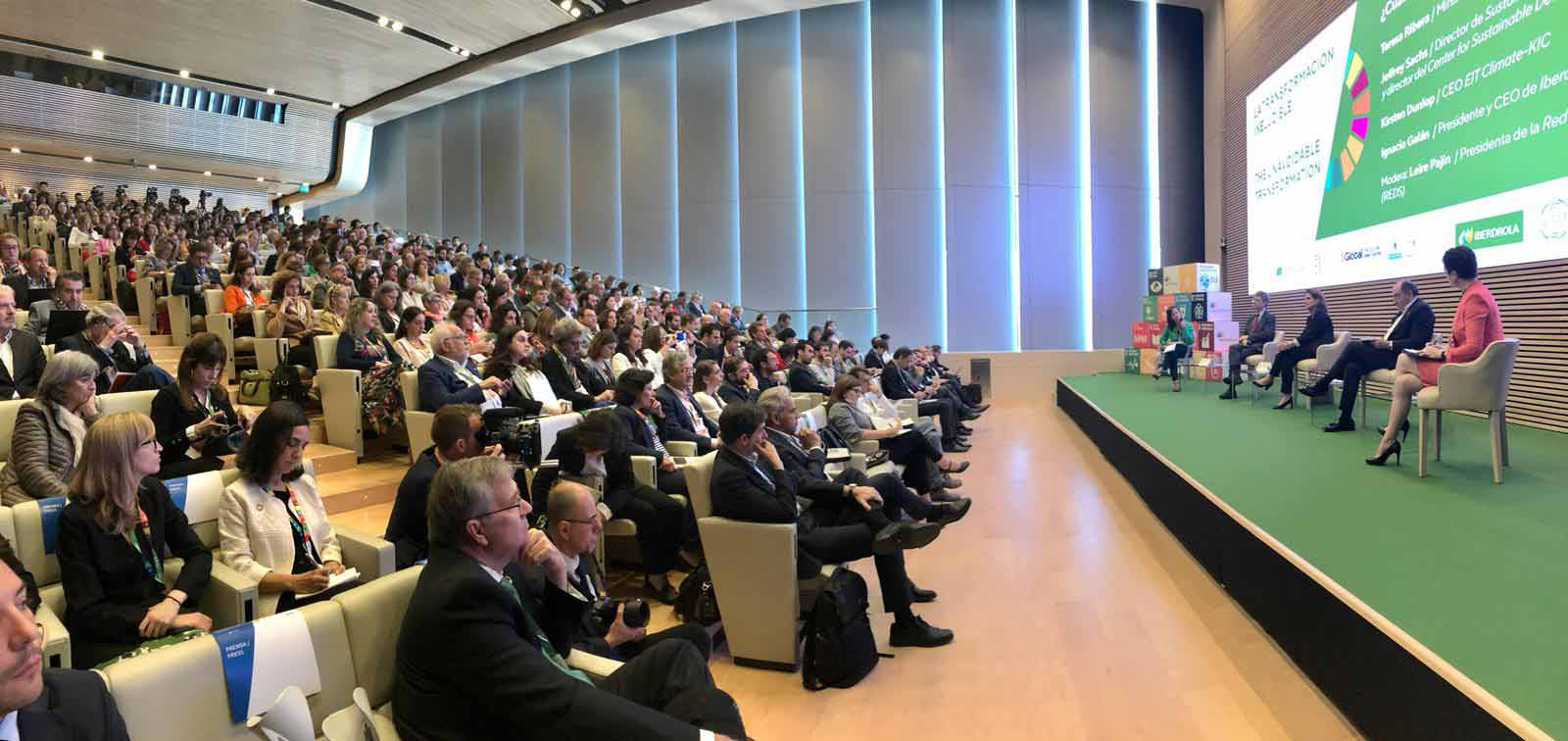A Call to Accelerate Collective Transformation
In an event coorganised by ISGlobal with more than 300 attendees, multidisciplinary experts signed the Madrid Declaration for the fulfillment of the 2030 Agenda
29.05.2019
¿How to accelerate the systemic and sustainable transformation needed for fulfilling the 2030 Agenda? This was the debate spurred by “Acelera 2030”, an event coorganised by ISGlobal, the Technical Uniersity of Madrid (itdUPM), the Spanish Sustainable Development Network (REDS), and Iberdrola, in collaboration with Climate-KIC and CSIC, which took place in Madrid on May 28. Europe’s leading role, the need for profound and radical change, and the sense of urgency were recurring themes during the day.
In front of an auditorium packed with more than 300 attendees, Jeffrey Sachs, director of the Sustainable Devlopment Solutions Network (SDSN), Teresa Ribera, Spanish Minister for Ecological Transition, Kirsten Dunlop, CEO of Climate-KIC, and Ignacio Galán, CEO of Iberdrola, opened the debate in the inaugural session, chaired by Leire Pajin, president of REDS and director of Global Development at ISGlobal, an institution supported by “la Caixa”. They all highlighted Europe’s key role in leading the way. Europe is a “global public good” and must “rebuild its popularity to avoid populism”. For Ribera, it is important to identify people’s fears and concerns and make them benefit from the changes related to the agenda.
“Narratives for change” was the topic of the first session, chaired by Gonzalo Fanjul, who introduced the narrative – the way we explain our ideas – as a driver of change: “there is no way we can achieve this agenda without a common narrative.” “Technology is not enough to respond to complex problems, and can even be counterproductive,” explained Gorka Espiau, professor at McGill University. Active listening is crucial for understanding how to promote social change, as well as the simultaneous exploration at different levels (community, entrepreneurial, regulatory…). An important concept is that systemic change is more likely to occur when associated with collective values, such as equity. The speakers also underlined the role of emotions in changing narratives, and that the SDGs are the only global narrative that fosters cooperation and collective solidarity.
The second session explored how to catalyse change through a new approach to innovation: an innovation with and for organisations, cities and authorities interested in solving their problems, based on the use of open data, and that bets on multiple initiatives based on their probability of inducing change rather than on merits. An innovation that generates metrics to give value to the fulfillment of the goals.
In the third session, speakers gave some examples of initiatives in cities, ports or energy that are encouraging but need to interconnect with other actions in order to reach a large scale effect. Mark Nieuwenhuijsen, director of the Urban Planning, Environment and Health Initiative at ISGlobal, reminded the audience that cars occupy 60% of public space in cities, and that systems thinking is needed to achieve human-scale cities.
While transformation has begun, the question is whether we will get there in time. Jeffrey Sachs reminded the audience that there is very little time left for acting: even if we stop all emissions today, temperatures will continue to rise beyond the 1.5oC limit, before reaching a new equilibrium. And data indicate that the process is accelerating. He insisted on Europe’s responsibility in defining a roadmap to decarbonize by 2050 and in engaging China, India, Africa and Latin America through “decarbonizing” partnerships.
"Many of Spain's companies are at the cutting-edge of the new clean green technologies. Spain's role in the #SDGs will be of great global significance in the years ahead"#JeffreySachs, @UNSDSN director, at #Acelera2030 pic.twitter.com/ZoZTLZ69Qu
— ISGlobal (@ISGLOBALorg) 28 de mayo de 2019
During the concluding session, ISGlobal general director, Antoni Plasència, underscored the role of science in achieving the SDGs – researchers play a key role as drivers of social transformation. Planetary health is an example of catalyst for achieving the goals, since it involves a new way of conceiving human health as something inextricably linked to the good shape and management of our ecosystems.
The event concluded with the Madrid Declaration, a call for scientists, decision makers, business people, and civil society to accelerate collective transformation.
¡Gracias a todos/as por participar en #Acelera2030!
— ISGlobal (@ISGLOBALorg) 28 de mayo de 2019
✊Lanzamos una llamada a la aceleración para científicos/as, responsables políticos/as, directivos/as de empresas y representantes de la sociedad civil.
��Lee aquí la Declaración de Madrid: https://t.co/9tTJUtTlF3 pic.twitter.com/xwuY5Qcr28



